Reading from the Beatitudes
We are each one of us here because we have been captured, our hearts and our wills are bent to a common purpose and a common faith. We are each of us here because at some point in our lives we, like those Emmaus Road travellers, felt our hearts strangely warmed within us.
Some of us have to come to faith in Jesus Christ quite dramatically, being confronted by our own sin and limitation in the mirror of God’s unconditional, uncontainable love and grace.
Some, and I’m among them, were nurtured in the faith since our baptism as infants. My whole perspective, the lens through which I view the world has been shaped and formed by my experience of fellowship, liturgy, prayer and scripture within the Anglican Church of Aotearoa New Zealand. This has been the context in which I have been captured by Jesus and nurtured in my relationship with him.
However we have come to faith we are each of us here because we have a deep belief in Jesus, we each have a consistent commitment to follow him and have found love for him. Inadequately, hesitantly we seek to apply the life and teachings of Jesus to our lives on a daily basis. We are, each one of us, transformed every day by this encounter with the living Christ. Through Christ we continue to be transformed by this sense of the presence of God which breaks in upon us.
Simply we are a people who know ourselves to be utterly, profoundly and unconditionally loved. We are a people who recognize and proclaim that this is true for every other human being, indeed is true for the whole of creation. Therein lies the obligation:
We know that we do not live in a fatalistic, predetermined world, nor in an arbitrary or random one, but within a loving relationship that involves freedom, and choice and invites reciprocity. We stand in silent awe of a love that sets us free to respond or to reject, to build up the way of love or to distort and corrupt that way. A love that is so uncompromising in its expression that it just cannot intervene to control, or to manipulate, like some giant puppeteer – because then this would quite simply not be love.
It is a love that cannot contain itself; it is a love that has to reach out in a continuous movement of self-offering, self-giving, self-surrender. A love that in spite of rejection, in spite of distortion reaches out and reaches out and reaches out because in its very character it can do no other.
We know ourselves to be caught up by a love that, because it is love responds to suffering and rejection by taking that suffering and rejection upon itself. God, arms outstretched upon the cross.
E te whanau we are the Body of Christ,
By one Spirit we were baptised into one body.
Call to Conversion
We are a people who know our need of God, the God that Christ points us towards. We also know ourselves to be individuals and a people constantly in need of conversion. The call to ‘turn to God’ is consistently placed before us as individuals and as a Church. We are constantly seeking the mind of Christ as we discern the movement of God, and where god is calling us.
Conversion is not a single event or moment in our journey either individually or collectively but rather we are constantly called to this process of turning away from and turning towards a new possibility, a new way of being.
We turn from sin and selfishness, from idols and habits, from bondages, from the demons - private and public. We turn from all that binds us and oppresses others. We turn, if you like, from the powers of death. They no longer hold their grip upon us. We are, after all, a resurrection people.
We turn to belief, to hope, to trust. We are converted to compassion, to justice and to peace. Conversion in the Bible is always grounded in history, always in a particular and actual situation. People turn to God in the midst of historical events and dilemmas and changes. Turning from, and turning to, was always deeply personal but it is never private.
The call to conversion will always be profoundly disturbing, challenging for any established order, whether of the individual, society or the Church. Conversion in the New Testament can only be understood from the perspective of the Kingdom of God. To be converted to Christ is to give one’s allegiance to the Kingdom, this new community inaugurated in Christ so what begins as a private decision becomes intimately related and linked with the fulfilment of the Kingdom.
The Sermon on the Mount, specifically the Beatitudes explains what this Kingdom is like. The message is clear and it’s compelling. It’s a practical vision of how to live in the new order and what it means to follow Jesus. It’s, if you like, a charter of the new community. The character, values and norms of this new age are described. They begin with a series of blessings rather than a series of obligations.
Renewal in Discipleship
The early Christians were referred to as “The People of the Way”, more than simply individuals who had been converted, they were now a people; they were a community of faith which manifestly expressed a new way of inter-relating and they were absolutely distinctive. It’s recorded that Aristides described the Christians to the Roman Emperor, Hadrian, in this way.
‘They love one another. They never fail to help widows; they save orphans from those who would hurt them. If they have something they give freely to the man who has nothing; if they see a stranger, they take him home, and are happy, as though he were a real brother. They don’t consider themselves brothers in the usual sense, but brothers instead through the Spirit, in God.”
These early Christians were known for the way they lived not only for what they believed. What they believed and how they lived were intertwined. They were recognised for their distinctive lifestyle – The Way”.
The message of the Kingdom of God, this Way, this new Community became more than simply an idea.
Their love was given daily expression. Reconciliation was actually occurring. People were no longer divided into Jew and Gentile, slave and free, male and female. In this community the weak were protected, the stranger welcomed. People were healed, and the poor and dispossessed were cared for and found justice.
Everything was shared, joy abounded and ordinary lives were filled with praise. Something was happening among these Christians that no-one could deny. See how these Christians love one another.
The quality of life shared in the Christian community was a vital part of the evangelistic message of the early Church. Christian fellowship and care for the marginalised became the companion of the Christian gospel.
How we live, the quality of our community life, who is accepted, restored, transformed, is a fundamental part of that proclamation.
This is the challenge; to be more and more authentically be disciples of God in Christ. Daily conforming ourselves to the way of Christ, to the character of Christ.
How would it be if we were truly to live, individually and corporately, as Disciples of Christ – as if Jesus really meant the things he said?
There is the rabbinical image of discipleship, of the disciple being the one who walks so closely in the footsteps of the rabbi that the dust flicks up from the rabbi’s sandals and covers the disciple. There is another image of the rabbi as the one who helps us to see! Who stands beside us describing the landscape in front of us and the landscape beyond what we see … the rabbi needs to stand alongside so as not to be in the way.
To be a disciple of Christ in the world is demanding, it requires us to bring Gospel, “Sermon on the Mount” principles to bear on the stuff of ordinary life; the world of commerce, education, social and economic policy making, political decision making.
If Jesus is human as we are human, then the faith becomes absolutely current, pertinent, and awaiting our response. What the early disciples confronted was the central Biblical miracle, the incarnation, the presence of God in the human, God as one of us. The challenge and the invitation that Jesus holds before us is the possibility that we too as human beings can be the temples of God's presence, the vehicles of God's action, we can become the body of Christ.
If that sounds too lofty and theological, think of it in terms of the incident that arises out of the lore surrounding the Polish pianist, Paderewski. A mother wanted to encourage the progress of her young son at the piano and so she bought two tickets to a Paderewski performance. When the night arrived she found their seats near the front of the concert hall and they eyed the large Steinway parked by itself on the stage. Soon the mother found a friend to talk with and she did not notice the boy slip away. When 8:00 p.m. arrived the house light dimmed, the spotlights came on, the Steinway was bathed in light, and only then did this mother notice that her son was seated at the piano bench, where he began innocently to plunk the keys in a rendition of Twinkle, Twinkle, Little Star. The audience roared, his mother gasped, but before she could retrieve her son, Paderewski himself appeared and moved quickly towards the keyboard. "No, don't quit, keep on playing," he whispered to the boy. And reaching past him with his left hand the Master began improvising a bass part, and then with his right hand, he reached around on the other side of the boy to add a running obbligato. The crowd was spell bound and the piece concluded in thunderous applause as the boy announced, "I didn't know I could do that."
That's incarnation. We are only human; we do not feel worthy or able, but by some miracle of grace, it is the human that God uses. God whispers in our ear, "don't quit, keep on playing," and as we continue, we are lovingly enfolded, graciously inspired, and from our feeble efforts something wonderful can emerge. But it is also a modeling of how we might disciple, mentor others in the faith – standing alongside, sitting alongside, don’t quit, keep playing – I will play alongside you, and you will be surprised what you are capable of.
E te whanau we are the Body of Christ,
By one Spirit we were baptised into one body.
Our Unity is in Christ through the Grace of God
Our unity is not some social or organisational construct. Our unity is not based on our desire to stay together or even on our agreement with each other, or our love for each other. Our unity is rooted in God’s active loving initiative. It is God in Christ who always initiates the relationship, it is God who repairs and rebuilds our relationship with God.
So our unity is founded in Christ’s gift of himself on the cross, a gift entirely of God’s grace.
We cannot walk away from each other, to do so is to deny the presence of Christ in the other, to do so is to ignore the obligations of our relationships to each other in and through Christ.
E te whanau we are the Body of Christ,
By one Spirit we were baptised into one body.
Keep the unity of the Spirit in the Bond of Peace.
Amen, we are bound by the love of Christ
Perhaps, acknowledging God’s Grace and our need to more fully conform ourselves to the “the way” of Christ we will more fully live out these obligations of relationship, then we will come to a place where we can say in confidence and truth, “In Christ we move forward together.”
Reading from the Beatitudes

















Comments
Log in or create a user account to comment.